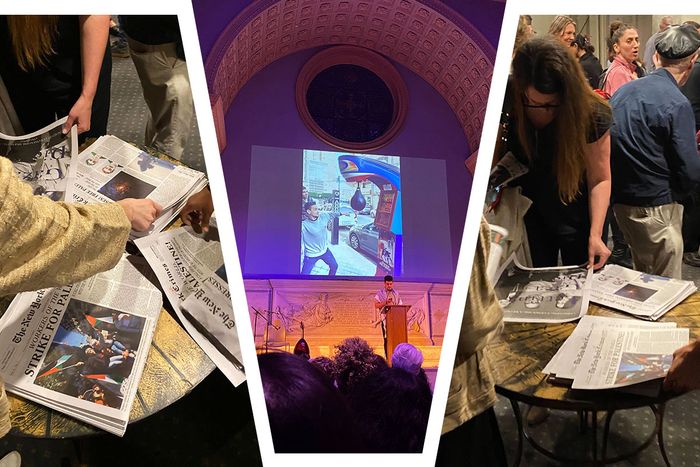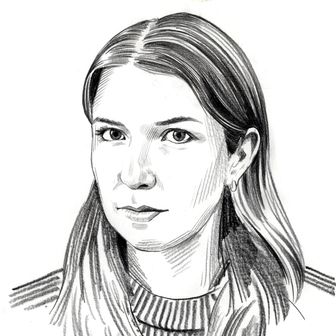
On first view of Tuesday night’s sold-out Freedom to Write for Palestine reading, the event seemed almost indistinguishable from what that corner of the city has seen in recent weeks. For blocks, I had walked behind someone (an author, perhaps?) wearing a keffiyeh around their shoulders, only for them to peel off in the direction of Washington Square Park — the site, along with bits of New York University property around it, of near-constant student-led protests and encampments, the most recent of which had been cleared less than a week before. Judson Memorial Church, which sits on the southern edge of the park, had its doors flung open, and a dozen or so people were standing outside in the 80-degree heat. I made my way inside, where the front rows were already filling up with a crowd of all ages wearing hijabs, protest-slogan T-shirts, and recently unburied summer dresses.
The event, benefiting We Are Not Numbers, a writing nonprofit in Gaza, was held in response to a series of issues that have destabilized the American PEN chapter in recent months. PEN America’s delayed and, many believe, inadequate response to Israel’s occupation of Gaza led just under half of nominated authors to drop out of the running for its literary awards; nine out of ten nominees withdrew from consideration for the PEN/Jean Stein Book Award, which comes with a $75,000 prize. Many others, including Naomi Klein and Isabella Hammad, withdrew from its prestigious annual World Voices Festival. In response, the organization canceled both the awards ceremony and the festival, which were set to be held this spring. (Winners were chosen, but cash prizes that could not be awarded because the winner had withdrawn were allocated elsewhere, and the $75,000 prize was donated to the Palestine Children’s Relief Fund at the direction of Jean Stein’s estate. PEN America’s gala is still scheduled for later this month.)
Over the course of two hours, as the audience watched from folding chairs, 18 authors and translators — and one musician, Huda Asfour, who sang and played the oud — got up to speak in front of a duo of carved stone angels and a verse from Matthew on the wall behind them. They included Michelle Alexander, author of The New Jim Crow, and Sabrina Imbler, who both withdrew from the World Voices Festival; the poet Evie Shockley, who withdrew from the PEN awards; and Esther Allen, a writer and translator who co-founded World Voices in 2004 with Salman Rushdie and Michael Roberts, as well as Mark Nowak, Seth Goldman, and Lorraine Garret of the Worker Writers School, whose members typically perform at the festival. A large portion of the room seemed to have some connection to PEN America itself. There were laughs at in-jokes and hisses at the mention of PEN executive Suzanne Nossel’s salary. “I am not cool enough to get an invitation to decline, but I have secondhand declination,” said emcee Derecka Purnell, a writer and lawyer.
“The night was just about trying to provide a base and a focal point and a point at which the writers who are pulling out of something communal, instead of being left alone, also get to be in community,” Omar Robert Hamilton, co-founder of the Palestine Festival of Literature, which organized the event along with Writers Against the War on Gaza and Amplify Palestine, told me earlier in the afternoon. “I think when authors are faced with organizations that are trying to impose this silence on them, trying to have events and festivals and awards that claim they’re above politics — what does that mean? That’s just a total fallacy. And that’s what’s being rejected.”
Hari Kunzru, a novelist and journalist who read an excerpt from a 2017 piece he wrote after a visit to Palestine, told me his decision to withdraw from the World Voices Festival was not made lightly. He’s unhappy with some media coverage of the boycott, including a recent piece in The Atlantic. “It seems to imply that there’s this kind of evil group of writers who are intimidating their peers into silence with some kind of authoritarian position, which I think is a disgusting slant,” he said. “But what’s happened is that the different groups of people have kind of come to these conclusions in different ways. It’s been very scattered, and it’s been to do with people following their own conscience.” As a former English PEN deputy president, he said, “my relationship is one of somebody who thinks that PEN’s mission is very important. I think PEN needs a reset in the U.S., and it might be very useful for American PEN to look at how other countries are doing things.”
“The thing I want to acknowledge is that some of the people who’ve withdrawn are very established writers and can make these kinds of gestures without much cost to themselves,” Kunzru said. “But some of the people who have withdrawn are, for example, debut novelists for whom a prize nomination is the biggest thing that’s happened to them. It’s quite a big sacrifice to turn it down — and yet they have.”
The reading opened with comments from the novelist and We Are Not Numbers mentor Nancy Kricorian, who harshly criticized the U.S. wing of the organization. “While PEN America has organized a street rally in support of Ukrainian writers imprisoned by Russia and taken a delegation of Ukrainian writers to meet with Congress,” she said, “it has yet to organize any event on behalf of Palestinian writers who have been imprisoned and killed by Israel.” PEN America’s call for a cease-fire, she said, “came only after over 1,000 writers had signed a letter denouncing the organization for its inaction.” (The organization has pushed back against criticisms, claiming to have offered direct assistance to Palestinian authors, citing statements about the war it has made since October 7, and forming a working group to review its work going back ten years.)
“PEN America’s priorities so often align with the U.S. government’s own foreign-policy goals that one writer quipped, ‘PEN America has turned into an outpost of the U.S. State Department,’” Kricorian said. When she mentioned PEN America United, the organization’s union, cheers erupted.
The translator Nicholas Glastonbury, who read a poem after participants performed works by Gazan writer Haya Abu Nasser and Palestinian American Fady Joudah, was even less equivocal. “You think about the work that goes into making Israel-slash-Palestine a common sense, a whole empire, brutalizing and bombing the world over in order to preserve this lexical gesture and entire literary apparatus conscripting the cultural capital of its most middling writers in the service of this declension, this move to innocence that attempts to make Palestine unthinkable on its own,” he said. The audience broke into giggles and claps at his mention of “middling writers.”
The room quieted when Mahmoud Alyazji, a young writer from Gaza, read a piece about his friend Mohammed Zaher Hamo, who was killed by an Israeli air strike in November, as a slideshow of images of Hamo played behind him. “Before I sleep, I have this image of your body under the rubble that flashes into my mind and makes me sick,” he read. “I pick up my phone and go to our photos. I look at you carrying that watermelon on the beach and smiling in hopes it will wipe out the cruel image of your cold body.”
Afterward, a scattering of people hung around for a while, talking by the stage and grabbing copies of The New York War Crimes. The space — “this glorious radical church,” as one person described it — was echoey and a little humid, with portraits of people like Audre Lorde and Bayard Rustin gazing down from overhead. “I’m someone who’s been to a fair number of readings, but to be in this incredible space with these stained-glass windows of thinkers and writers, and also to hear from writers who were relaying poems from writers who were not able to be here, was incredible,” said Sophie van Well Groeneveld, who came with friends from her creative-writing graduate program.
As chairs were folded and put away, readers and audience members lingered in clusters in the warm night air. Across the street, the park was still buzzing with activity and music.


